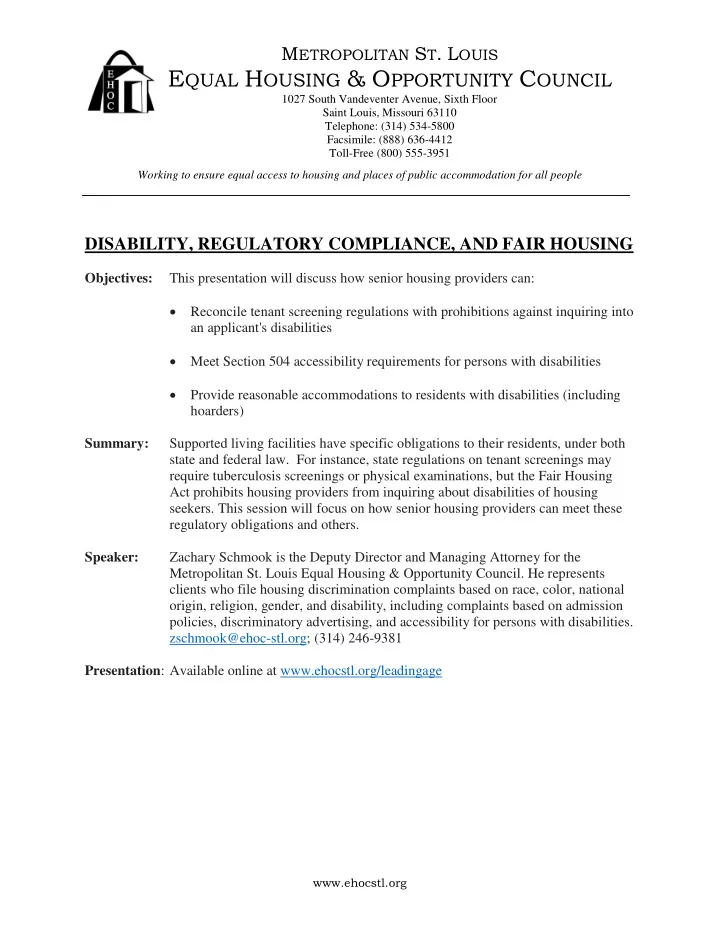

M ETROPOLITAN S T . L OUIS E QUAL H OUSING & O PPORTUNITY C OUNCIL 1027 South Vandeventer Avenue, Sixth Floor Saint Louis, Missouri 63110 Telephone: (314) 534-5800 Facsimile: (888) 636-4412 Toll-Free (800) 555-3951 Working to ensure equal access to housing and places of public accommodation for all people DISABILITY, REGULATORY COMPLIANCE, AND FAIR HOUSING Objectives: This presentation will discuss how senior housing providers can: Reconcile tenant screening regulations with prohibitions against inquiring into an applicant's disabilities Meet Section 504 accessibility requirements for persons with disabilities Provide reasonable accommodations to residents with disabilities (including hoarders) Summary: Supported living facilities have specific obligations to their residents, under both state and federal law. For instance, state regulations on tenant screenings may require tuberculosis screenings or physical examinations, but the Fair Housing Act prohibits housing providers from inquiring about disabilities of housing seekers. This session will focus on how senior housing providers can meet these regulatory obligations and others. Speaker: Zachary Schmook is the Deputy Director and Managing Attorney for the Metropolitan St. Louis Equal Housing & Opportunity Council. He represents clients who file housing discrimination complaints based on race, color, national origin, religion, gender, and disability, including complaints based on admission policies, discriminatory advertising, and accessibility for persons with disabilities. zschmook@ehoc-stl.org; (314) 246-9381 Presentation : Available online at www.ehocstl.org/leadingage www.ehocstl.org
DISABILITY, REGULATORY COMPLIANCE, AND FAIR HOUSING Page 2 Metropolitan St. Louis Equal Housing & Opportunity Council Today ’ s Topics: Tenant Screening and the Fair Housing Act Section 504 of the Rehabilitation Act Reasonable Accommodations (including hoarding) What is a Disability? Under the Fair Housing Act (FHA) and the Rehabilitation Act, a disability (or handicap) is a physical or mental impairment that substantially limits one or more major life activities. 42 U.S.C. § 3602(h); 29 U.S.C. § 705(20) Impairment - orthopedic, visual, speech and hearing impairments, cerebral palsy, autism, epilepsy, muscular dystrophy, multiple sclerosis, cancer, heart disease, diabetes, HIV/AIDS, developmental disability, emotional illness, drug addiction and alcoholism 24 C.F.R. § 100.201 Handicap (a)(2) Major Life Activity - seeing, hearing, walking, breathing, performing manual tasks, caring for one’s self, learning, and speaking . 24 C.F.R. § 100.201 Handicap (b) Tenant Screening and the Fair Housing Act FHA prohibits queries into a person ’ s disability status or the nature of one ’ s disability, BUT . . . MO regulations require ALFs/PCFs to ensure residents: o Are free of tuberculosis, 19 C.S.R. § 30-86.047(19) o Receive a physical, , 19 C.S.R. § 30-86.047(19) o Can navigate a path to safety, § 198.073.1, RSMo o Do not present a risk of harm to self/others, § 198.073.4(8), RSMo o Etc. Permitted o Proof of qualifying disability o Determine threat to others (TB) o Flexibility where intent is to benefit persons with disabilities Bangerter v. Orem City , 46 F.3d 1491, 1505 (10th Cir. 1995) Prohibited o Denying applicant because of disability o Decisions based on stereotypes o Asking unjustified questions Best Practices : o Separate admissions from treatment o Permit reasonable accommodations o Document everything o Local government policy is not a complete defense Reeves v. Rose , 108 F. Supp. 2d 720 (E.D. Mich. 2000)
DISABILITY, REGULATORY COMPLIANCE, AND FAIR HOUSING Page 3 Metropolitan St. Louis Equal Housing & Opportunity Council Section 504 of the Rehabilitation Act Prohibits discrimination against persons with disabilities in programs receiving federal funds Found not to apply to LIHTC properties (although properties with direct financial assistance under the LIHTC Exchange program or TCAP are covered) and private landlords who accept vouchers from housing authorities (Section 8/HCVP) Three basic requirements o No discrimination in programs or activities Watch out for BINGO night! http://www.nytimes.com/2015/02/03/science/a-facilitys-bingo-call-you- cant-play.html o Making reasonable modifications or accommodations Must pay reasonable costs for physical modifications for accessibility o Physical accessibility 5% (or at least one unit) must meet stricter accessibility guidelines for persons with physical impairments 2% (or at least one unit) must be accessible for persons with hearing/vision impairments Reasonable Accommodations Changes in terms and conditions of lease o Examples : accessible parking, lease reading accommodations for blind or mentally disabled, modified payments for SSI o HUD-DOJ Joint Statement: http://www.hud.gov/offices/fheo/library/huddojstatement.pdf NECESSARY + REASONABLE = MUST GRANT ACCOMMODATION Making a Request o Disability – Must state that tenant has a disability o Accommodation – Should specify requested accommodation o Nexus – Identify link between accommodation and disability Hoarding o Lease Violations – Infestation, blocking exits, fire hazards, health code violations, garbage/odor/feces o Disability – Hoarders that rise to level of lease violations will almost always qualify as persons with disabilities o Accommodations Time and assistance to clean Health and safety violations cannot continue indefinitely Truly imminent threat can be addressed immediately o Best Practices: Reach out for additional support Put a plan with timetables in writing Set reasonable, achievable goals
Recommend
More recommend